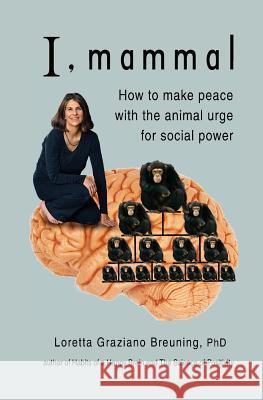I, Mammal: How to Make Peace With the Animal Urge for Social Power » książka
I, Mammal: How to Make Peace With the Animal Urge for Social Power
ISBN-13: 9781941959008 / Angielski / Miękka / 2011 / 302 str.
We have inherited a brain that seeks respect and attention as if your life depended on it. The mammal brain rewards you with the nice calm feeling of serotonin when you get respect and attention. But serotonin is quickly metabolized and you have to do more to get more. Each brain tries to get it in ways that worked before because past serotonin surges built a pathway in your brain. This is why mammals are so eager for social power, and see obstacles to social power as survival threats.
Mammals live in groups for protection from predators, but group life is frustrating. Higher-status individuals end up with better mating opportunity and foraging spots. You are not trying to spread your genes, but natural selection built a brain that rewards you with a good feeling when you do things that promote your genes. Our appetite for status is as natural as our appetite for food and sex. This is why "junk status" gets people's attention.
This book shows you how to enjoy serotonin without the frustrations of an endless quest for social power.
You may say you're "against status," but if you filled a room with people who said that, a status hierarchy would soon form based on how hard each person insists. You would never think this in words, but the mammal brain works with neurochemicals instead of words. Your neurochemical ups and downs make sense when you know how social power promotes survival in the animal world. Nothing is wrong with us. We are mammals. We work hard to restrain these urges, and we can celebrate how well we do with the mental equipment we've got instead of focusing on our flaws.
The mammal brain evolved to promote survival through social alliances. It equips a mammal to live alongside stronger and weaker individuals. It constantly compares itself to those around it. If it sees itself in the position of weakness, it releases cortisol ("the stress chemical"), which motivates it to hold back to avoid conflict. If it sees itself in the position of strength, it releases serotonin and yields to the impulse to meet its needs. We humans feel this dynamic constantly, which is why we have so many words for it: ego, competitiveness, pride, respect, one-upping, self-confidence, attention-seeking, social dominance, arrogance, social-climbing, assertiveness, manipulative, ambitious, oppositional. We can finally make sense of our hybrid brain thanks to an accumulation of research in animal science and neuroscience.
It's not easy being mammal
The urge for social power is easy to see in others, especially your social rivals. It's hard to accept in yourself and your social allies. You can wire yourself to stimulate your serotonin without being a "jerk." When you understand your inner mammal, you can learn to relax about your social position instead of being a prisoner of "junk status." What a relief
We have inherited a brain that seeks respect and attention as if your life depended on it. The mammal brain rewards you with the nice calm feeling of serotonin when you get respect and attention. But serotonin is quickly metabolized and you have to do more to get more. Each brain tries to get it in ways that worked before because past serotonin surges built a pathway in your brain. This is why mammals are so eager for social power, and see obstacles to social power as survival threats.
Mammals live in groups for protection from predators, but group life is frustrating. Higher-status individuals end up with better mating opportunity and foraging spots. You are not trying to spread your genes, but natural selection built a brain that rewards you with a good feeling when you do things that promote your genes. Our appetite for status is as natural as our appetite for food and sex. This is why "junk status" gets people's attention.
This book shows you how to enjoy serotonin without the frustrations of an endless quest for social power.
You may say you’re “against status,” but if you filled a room with people who said that, a status hierarchy would soon form based on how hard each person insists. You would never think this in words, but the mammal brain works with neurochemicals instead of words. Your neurochemical ups and downs make sense when you know how social power promotes survival in the animal world. Nothing is wrong with us. We are mammals. We work hard to restrain these urges, and we can celebrate how well we do with the mental equipment we’ve got instead of focusing on our flaws.
The mammal brain evolved to promote survival through social alliances. It equips a mammal to live alongside stronger and weaker individuals. It constantly compares itself to those around it. If it sees itself in the position of weakness, it releases cortisol (“the stress chemical”), which motivates it to hold back to avoid conflict. If it sees itself in the position of strength, it releases serotonin and yields to the impulse to meet its needs. We humans feel this dynamic constantly, which is why we have so many words for it: ego, competitiveness, pride, respect, one-upping, self-confidence, attention-seeking, social dominance, arrogance, social-climbing, assertiveness, manipulative, ambitious, oppositional. We can finally make sense of our hybrid brain thanks to an accumulation of research in animal science and neuroscience.
It’s not easy being mammal!
The urge for social power is easy to see in others, especially your social rivals. It’s hard to accept in yourself and your social allies. You can wire yourself to stimulate your serotonin without being a “jerk.” When you understand your inner mammal, you can learn to relax about your social position instead of being a prisoner of “junk status.” What a relief!











